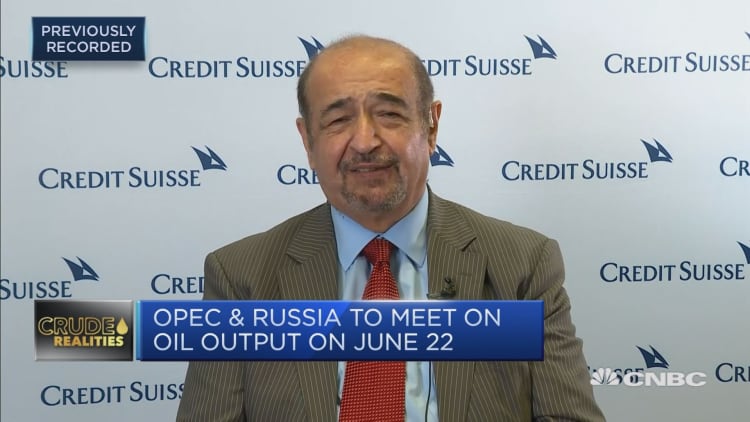Oil traders will be waiting to see what the world's most powerful oil producer Saudi Arabia — likened to "Superman" by the respected oil market expert Helima Croft — says and does at the forthcoming meeting of OPEC and non-OPEC producers on June 22.
"With unplanned outages escalating, geopolitical risks rising, and U.S. shale production facing infrastructure bottlenecks, Saudi Arabia is once again back in the driver's seat exerting significant influence over the oil market in 2018," Croft, the global head of commodity strategy at RBC Capital Markets, said Thursday.
"All eyes are on what course of action it will call for at the June 22 OPEC meeting in Vienna," she added in a note entitled "OPEC Watch List: Waiting for Superman."
OPEC and a group of non-OPEC producers, including Russia, are currently adhering to a deal struck in November 2016 to curb oil production (by about 1.8 million barrels a day) in a bid to support prices.
The strategy has worked with prices having risen from a low of around $26 a barrel in January 2016 to currently trade at around $76 for Brent and $66 for West Texas Intermediate (WTI).
Now, there are growing tensions over the cuts and pressure is growing on OPEC — from the likes of President Donald Trump — to increase supply to prevent prices from rising too steeply.
As such, the June 22 meeting is expected to be dominated by arguments over whether to increase production or maintain supply as it is. Saudi Arabia and Russia are reportedly ready to increase oil output while others like Iran and Venezuela are against such a move and want to maintain supply at the current level.
There are concerns that oil supplies from Venezuela, which is experiencing economic turmoil, and Iran, which will see a re-imposition of U.S. sanctions following the U.S.' withdrawal from a nuclear accord, could decline, prompting a supply shortage and further upward pressure on prices.
Saudi Superman?

While Saudi Arabia has the capacity to produce more oil, it "faces a delicate balancing act amid competing calls for how to deploy its spare capacity powers," Croft noted.
She highlighted that the vast majority of OPEC producers have almost no ability to offset a price decline with additional volumes, also noting that Saudi Arabia's own economic future — envisaged as part of its "Vision 2030" plan to transform its economy away from oil — could be jeopardized by lower oil prices.
"While Saudi Arabia is in a much better position than most of its sovereign producer peers, its own Vision 2030 policy initiatives could be imperiled by a precipitous plunge in prices," Croft noted.
She also warned that supply shortages could hit a number of OPEC members — Venezuela, Iran, Libya, Nigeria and Iraq (which are known as the "fragile five") – causing a potential loss of 2 million to 2.2 million barrels a day. A loss which she called "staggering."
Going it alone?
Speculation has risen that the OPEC and non-OPEC meeting could become so contentious that Saudi Arabia and Russia, the two most powerful oil producers in the world, could go it alone and increase their production without the agreement of other producers.
Russian President Vladimir Putin and Saudi Crown Prince Mohammed bin Salman are meeting Thursday ahead of the OPEC meeting, adding fuel to the fire over how those countries might influence the June 22 proceedings.
Speaking to reporters in Moscow Thursday, Saudi Energy Minister Khalid al-Falih said he expected a "reasonable and moderate" agreement next week when the oil-producing nations meet, Reuters reported. But he said that he had heard a proposal to increase combined oil output by 1.8 million barrels per day, erasing the cuts that are currently implementing.

"We will see where we go, but I think we'll come to an agreement that satisfies, most importantly, the market," he said, adding that he doesn't expect disputes with Iran and Venezuela at the summit.
Croft believed that some kind of modest increase will be agreed, with up to 500,000 barrels a day of additional supply being initially added to the market. The producers will also "likely strongly signal a readiness to act quickly to fill serious supply gaps as needed."
Still, Croft said that the meeting could prove so contentious that a production consensus proves elusive, leaving Saudi Arabia and Russia to act largely on their own.
"Even in a 'go it alone' scenario, we think the initial production increase will be modest — and aimed at reducing the high level of over-compliance with the 1.8 million b/d target — as no one wants to cause another collapse in oil prices," she said.


